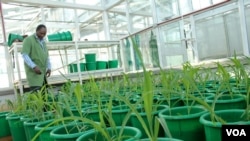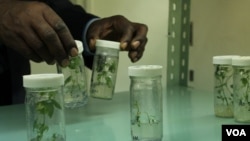With a virus threatening the crops of up to 70 percent of Kenya's maize farmers, a number of lawmakers are calling for the country’s controversial ban on GMOs - genetically modified organisms - to be lifted for the sake of food security.
If there is one thing you are almost guaranteed to find in a Kenyan kitchen, it is corn, known locally as maize. Corn is roasted by the side of the road, boiled with beans or ground into flour to make ugali, a Kenyan staple.
Agricultural researcher Simon Gichuki explains that for many Kenyans, maize is an irreplaceable part of their diet.
“They eat maize almost every day. There are people who eat it for lunch, and they also eat it for dinner and breakfast. So when there is no maize in Kenya, we usually say there is famine," said Gichuki. "Even when the other crops are doing well - like bananas, cassava, sweet potatoes - we say there is famine.”
This is why the past several years have been so alarming for Kenyans. The country’s cereal-growing heartlands have been ravaged by a virus called Maize Lethal Necrosis Disease. The Cereal Growers Association has said the disease could cut production this year by almost a third, with up to 70 percent of maize farmers affected.
According to Kipkorir Menjo, head of the Kenya Farmers Association, the virus could be a threat to food security.
In Kenya, more and more policymakers are starting to think that the solution to diseases like this is genetically modified organisms, or GMOs.
GMOs have been banned in Kenya since 2012, when a study found that GMO maize caused cancer in rats. The study was later discredited, and pulled from the scientific journal that had published it. But in Kenya GMOs are still illegal.
Gichuki, who runs the biotechnology unit at the Kenya Agricultural and Livestock Research Organization, says Kenyan scientists are already talking to foreign universities to start work on a Lethal Necrosis Disease-resistant maize. Several other types of GMO maize have been harvested already, including one crop in October.
Menjo says that among farmers themselves, opinions on GMOs are mixed. But a number of lawmakers have been speaking out in favor of lifting the ban.
“The pressure is from the MPs because they know the benefits, and why this kind of GMOs are necessary as far as food security is concerned," said Menjo. "Because every now and then we have been having challenges of having enough food to feed the nation.”
GMOs are still controversial in Kenya, and although Menjo supports legalizing them, he says many people are concerned about their potential side effects.
“You find that the unintended results is what most people fear. Because who is controlling to ensure that we have the positive results coming in and not the negative side of it? That is basically what makes people to be a bit skeptical," said Menjo.
But Gichuki is convinced it will not be long before he and his team of scientists will be able to distribute their newly-created GMO seeds to farmers.
“The government is very serious about food security, so I don’t see any reason why this ban is going to be there for long. It will definitely be lifted," said Gichuki. "And we in research are not just waiting - we are moving on, preparing, because we are confident that it will be lifted.”
Kenya’s GMO ban can only be lifted by the Cabinet, which has yet to make a decision.

